Freedom. Happiness.
In the duck world, nothing exemplifies these ideals like the practice of free-ranging. The idyllic vision of ducks frolicking joyfully in green pastures is irresistible.
At the same time, free-ranging can be dangerous, so it’s a controversial topic. Some people are dead set against anyone free-ranging their ducks; others feel sorry for any duck that isn’t allowed to free-range. Free-ranging isn’t for everyone, and deciding whether or not to free-range can be difficult, but in this article, I’ll cover the pros and cons, suggest eight ways to make free-ranging safer, answer frequently asked questions about free-ranging, and more.
What exactly is free-ranging?
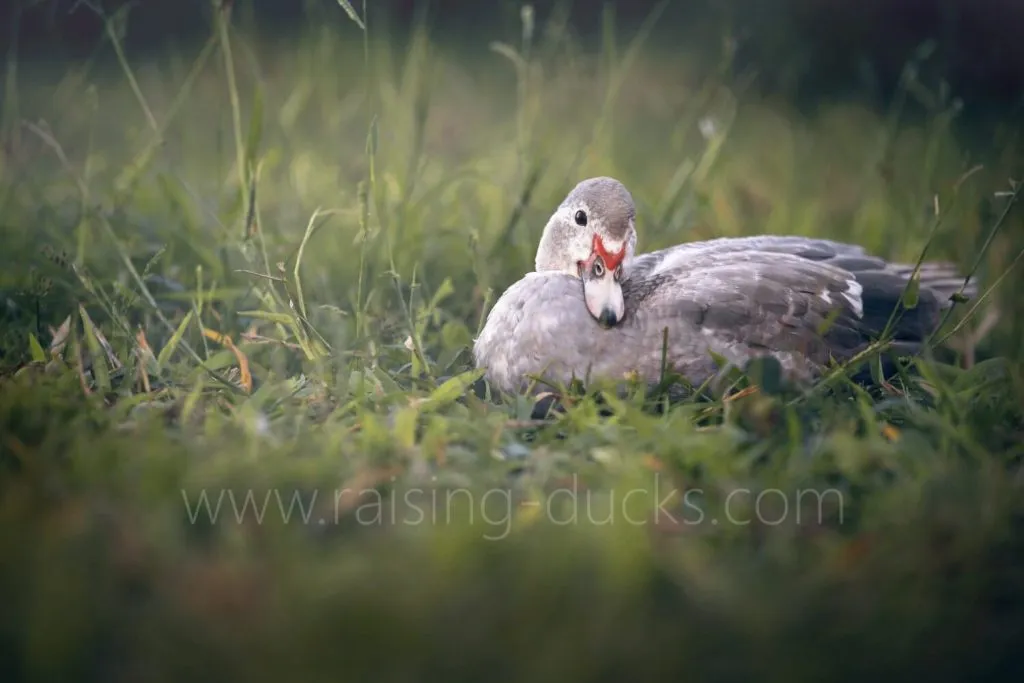
There’s room for debate. There are approximately three definitions of the word “free-range.”
One is the USDA definition: merely “access to the outdoors.” In practice, for commercial farmers, this means a screened porch, a tiny dirt run, or otherwise meaningless outdoor access. If you buy eggs in the store labeled as “free range,” they likely are from chickens that live in a barn and rarely, if ever, go outside, and certainly never have access to grass.
Then there’s the polar opposite. Some define “free range” as free range, nothing less: no fences, no confinement. The birds are free to go wherever they want. Usually, they are still confined at night, but sometimes they are free 24/7.
Thirdly, there’s what most backyard poultry raisers (and a few commercial farmers) consider free-range: access to space to roam, grass, bugs, and sunlight. This could mean anything from turning your birds loose in your fenced backyard to allowing your birds to roam over acres of pasture, whether fenced or not.
Either way, to be considered free-range, ducks need to be in an area large enough that they don’t destroy the grass cover, in my opinion. This usually means at least 250 square feet per bird.
I think fences do not automatically preclude usage of the term “free-ranging,” as long as the fenced area is large enough. I don’t think a small fenced suburban backyard qualifies as free-range. It’s just a large run.
In this article, we will ignore the USDA definition and define free-ranging as “access to space to roam, grass, bugs, and sunlight.”
Pros of free-ranging
1. More natural, healthy diet
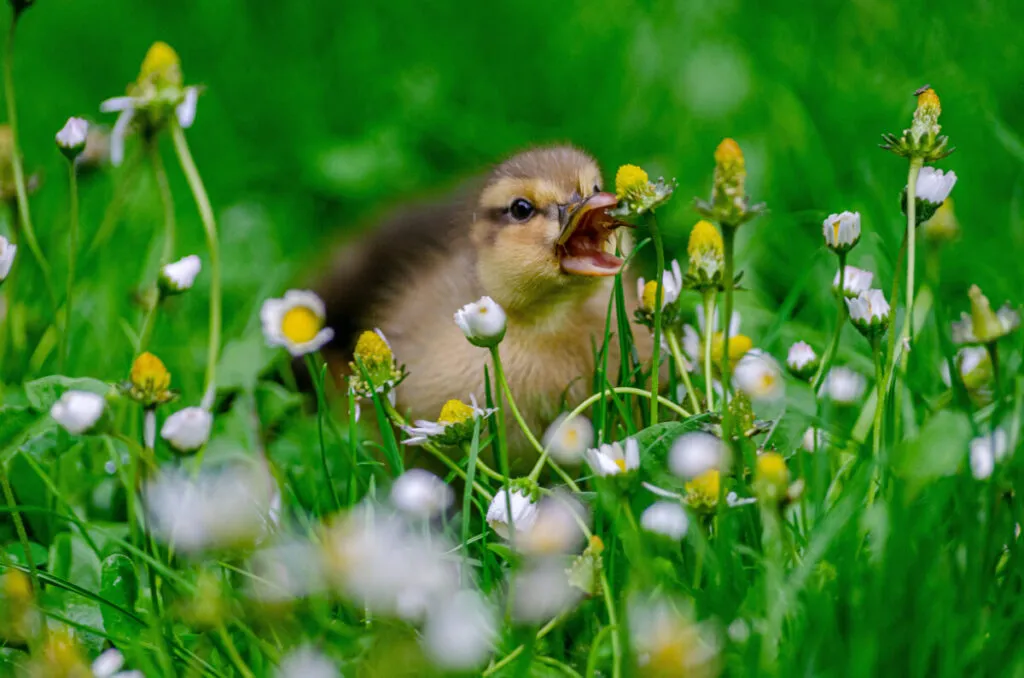
When ducks free-range, they get to eat what they’re supposed to eat: grass, weeds, leaves, seeds, worms, bugs, slugs, and other creatures and plants.
This is, of course, beneficial to their health, especially in the long term. Live food is much healthier than dead, processed food; fresh food is much healthier than grain that has been sitting in a silo for months; a varied diet is much healthier than eating the same thing every day. If their foraging area contains enough biodiversity (and not just lawn grass), ducks can self-balance their diet by choosing what they eat.
2. More hygienic surroundings
Some people think ducks stink. They don’t. Not if they have enough space.
Keeping coops, runs, and confined pens clean can be a constant challenge. Keeping them free of smell can be almost impossible. Ducks in confined areas will destroy ground cover quickly.
But when ducks are allowed to free-range, there should be no cleanliness or smell issues (assuming your yard is fairly sizable and you don’t overstock it). You’ll also have less run/coop cleaning to do.
3. Happier ducks
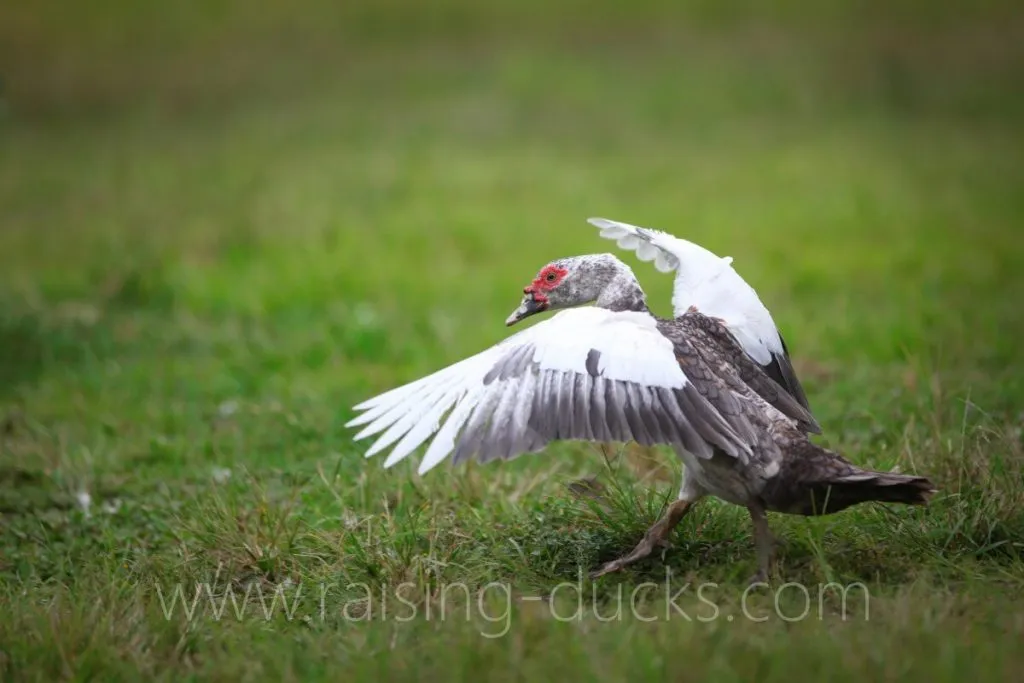
Ducks are much happier when allowed to free-range. Much happier. There’s nothing they like better than foraging and freely exploring (short of swimming, perhaps). Free-ranging vanquishes boredom and reduces stress.
If you’ve ever had your ducks confined to a run with ten square feet per duck (as is commonly recommended), you probably noticed how bored they were. Free-range ducks are far less likely to engage in boredom- and stress-related activities, such as feather picking, bullying, and even cannibalism.
4. Healthier ducks
As mentioned above, free-range ducks will be able to enjoy a healthier diet. Reduced stress and boredom is also beneficial to their health.
Since free-range ducks are likely to have a cleaner environment, they are less likely to be affected by disease or illness. They’re particularly less prone to respiratory issues.
They will be able to get more vitamin D due to all the extra sunshine they’ll be able to absorb.
They’ll get plenty of exercise while exploring, running around, and foraging, so they are at lower risk of becoming obese.
Parasite problems are also less likely in free-range ducks. The best way to prevent parasites is actually pasture rotation, but if ducks only have access to one area, the larger it is, the better.
5. Reduced feed costs
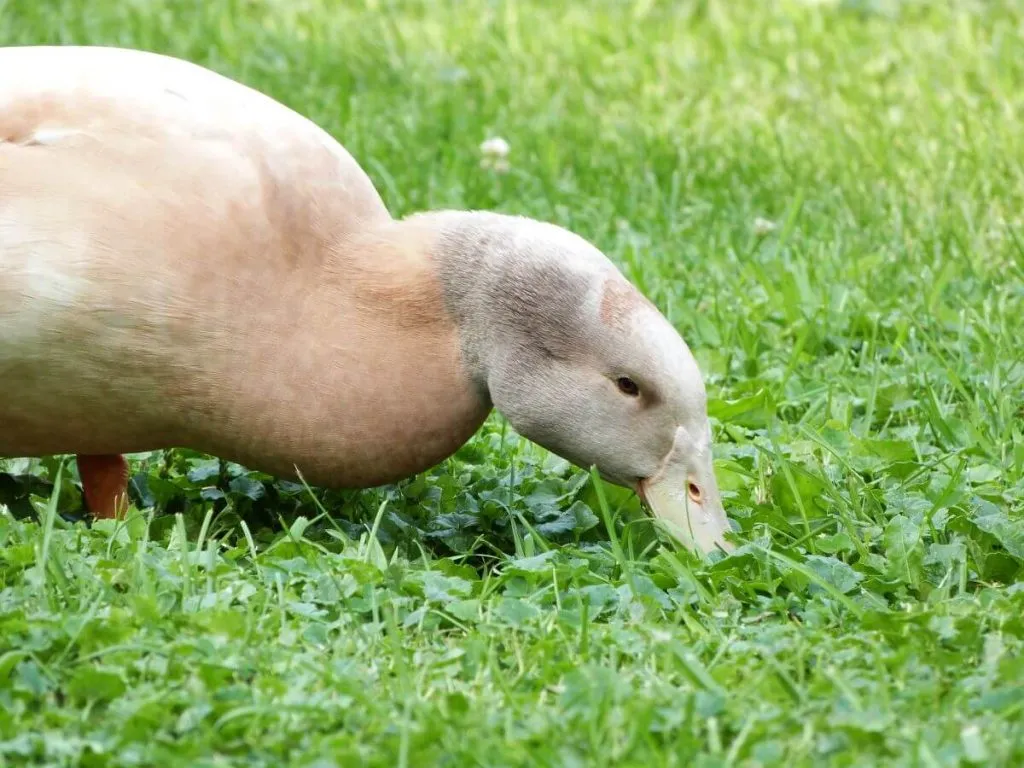
A happy Buff Orpington duck free-ranging. Photo courtesy of Kayli at thegaagirl.blogspot.com
Free-range ducks can find a good chunk of their own food through foraging, so you can save money on feeding them. You probably can’t stop feeding them altogether, but free-range ducks can often find 20-50% of their own food and sometimes more.
You won’t need to give free-range ducks grit, either. They can find it themselves if they can access the dirt. Calcium supplements are still important, though.
6. Better eggs

Eggs from free-range ducks are far superior to anything else. They are more flavorful, have beautiful dark yolks, and are much more nutritious.
A study done on free-range chickens in 2007 found that their eggs, compared to eggs from caged hens, had 66% more vitamin A, 300% more vitamin E, 700% more beta-carotene, 200% more omega-3, 33% less cholesterol, and 25% less saturated fat.
And you don’t need a study to know the difference. Eggs from free-range birds taste much, much better.
7. Reduced infrastructure costs
Fencing and infrastructure is expensive. If your ducks can free-range, you don’t have to spend as much money on building large runs.
However, you should still build a run even if you plan to free-range your ducks. If keeping the ducks confined is ever necessary (and it probably will be at some point, especially if you find free-ranging is too risky for your situation), it will be far better for your ducks if they still have access to a run.
8. Fertilizer and bug control
Free-range ducks will fertilize your yard with their droppings and will munch on many harmful or annoying bugs and pests. Ducks love to eat flies, slugs, beetles, and many other insects and small creatures.
Cons of free-ranging
1. Predation

By far the biggest issue with free-ranging is that it leaves your ducks vulnerable to predators. And there are many predators that like to snack on ducks.
In some areas, free-ranging is pretty much impossible: free-range duck flocks will be annihilated. In other areas, it’s doable but only if you’re willing to take some losses or take extra steps to keep them safe (such as using livestock guardian dogs). And in some areas, ducks are relatively safe free-ranging.
This is a major concern. Whether you can let your ducks free-range or not primarily depends on the predators in your area—and also, to some degree, how many losses you deem “acceptable” or “worth the risk.” No matter how safe your area may seem, it’s almost inevitable that a duck will someday disappear.
2. Ducks going places they shouldn’t
Free-range ducks will explore and wander around. Getting lost is unlikely, since ducks won’t travel very far on foot, but not impossible. More likely, your ducks will decide your porch or veranda is the best place to snooze the day away. Or they’ll take a dip in your pool. Or they’ll eat your garden. Or they’ll visit the neighbors and do their naughty deeds there. Or they’ll get in the road. Or they’ll cross the road.
If there is anything the ducks might destroy, any place you don’t want poop, or anywhere they might get into trouble, you will either have to fence the ducks out or fence them in.
3. Egg hunting

Busted! This duck, Cricket, stashed eighteen eggs under an overturned wheelbarrow. We didn’t find her until she went broody.
If you let your ducks free-range, you will also have to accept regular egg hunts. No matter how nice the nests in your coop are, sooner or later, your ducks will find a shrub or nook or cranny that they think is even nicer. Or if your ducks are the type that drop their eggs indiscriminately, finding their eggs may be even more difficult.
We’ve found eggs in wheelbarrows, under overturned wheelbarrows, in the back of the golf cart, in clumps of grass, in shrubs, in our fire pit, under stacks of pallets, under the brush hog, in flowerpots, in more flowerpots, in more clumps of grass, and so on.
In fact, here’s a video of where my Muscovies hid their eggs and where my Saxony and Khaki Campbell ducks dumped their eggs one week:
Think of it this way: it gives you a good excuse to get outside and stroll around. We all need more exercise and fresh air, right?
4. Lower yields
Commercial poultry feed is designed to produce maximum eggs or meat. A duck’s natural diet, while healthier, is not supposed to maximize egg production. Wild ducks only need to lay a few dozen eggs per year.
As a result, ducks that free range and have a more natural diet may not lay quite as much as ducks eating only commercial feed. However, genetics dictate egg production more than diet does, so the effect is likely minor.
The effect is more pronounced in meat ducks because when they free range, they expend energy running around rather than producing muscle. This can slow their growth and produce tougher meat. Because of this, most people who pasture their meat birds keep them in mobile pens, so they can still forage but won’t get a lot of exercise.
5. Yard damage

Mitzi, one of our Muscovy ducks, appropriating one of our flowerpots for use as a nest box. The plant perished.
If you have a nice yard with nice plants, your ducks may tear them up. Fortunately, ducks are not as destructive as chickens, since they don’t scratch or dustbathe, and they are not likely to jump into flowerpots and raised beds (unless they’re a breed that can fly), but they will still destroy many plants. In areas where they spend a lot of time, they will trample and destroy the ground cover. Any low, wet spots will become mud pits. They will poop on everything, too.
In particular, ducks will wreak havoc on gardens, so you will have to fence your garden in if you let your ducks free-range.
Should you free-range?
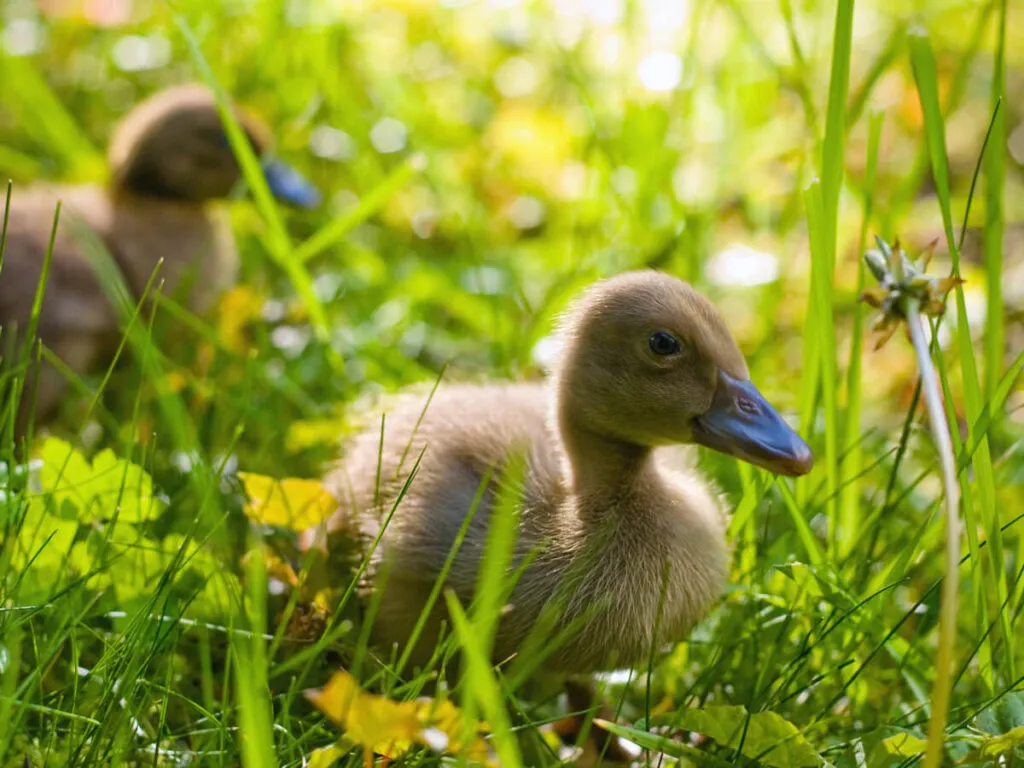
Photo credit: “Khaki Campbells” (CC BY-NC 2.0) by ap.
If your ducks are pets and you couldn’t stand to ever lose one, I wouldn’t recommend free ranging.
Or maybe the health and happiness benefits may be worth an occasional loss to you.
Research the predators in your area and, if possible, talk to other poultry raisers near you who free range before making a decision. Be sure to take as many measures as you can to make free-ranging safer (see the section below for tips).
If you have neighbors with unfenced yards within about 200 feet of your ducks’ coop, don’t let your ducks free range, at least not without their permission, and certainly not if they have dogs.
If you live near a busy road, I wouldn’t recommend free-ranging. Ducks may not have qualms about walking in the road. Alternatively, you could set up a low, cheap fence bordering the road. Ducks (if they can’t fly) aren’t likely to go over it, and while they may still go around it if it’s only fencing one side, it will lessen the risk.
Also, consider whether there are stray dogs around. Dogs can be one of the worst poultry predators. Don’t forget to consider your own dogs. Many dogs can’t be trusted around chickens, no matter how friendly they might seem.
It’s an individual decision. Free-ranging is never risk-free. You have to determine what you deem an acceptable risk.
My personal experience is that it’s worth it—for us and our situation. Our ducks love the freedom. I can’t imagine keeping them in a confined run. Before we installed a fence, we lost one or two ducks per year (out of a fairly large flock). Some simply disappeared. Two were killed by hawks. Every death is sad, of course, but keeping my ducks in a run would be sadder. Even being let out of their grassy mobile pens an hour late makes them mad.
Since building a four-foot fence around our property (two years ago), we’ve only lost one duck. I still consider them free-range because they have so much space and freedom, but the fence definitely helps to protect them.
Even though free-ranging is the ideal, you’re not a bad duck owner if you can’t free-range. Sometimes, fencing your ducks in is the only responsible decision.
FAQ
How do you make free-ranging safer?
You’re not shackled by circumstances. There’s actually a lot you can do to reduce the risk of free-ranging.
Here are the four biggest steps you can take to protect your ducks while they free-range:
- Provide ground cover (shade structures, bushes, trees, etc.) so your ducks can’t be seen by aerial predators and can quickly run to safety if necessary.
- Fence your ducks’ yard. As long as they have plentiful space, so what if they’re not technically 100% free?
- Get a goose or livestock guardian dog to guard your ducks.
- Don’t leave your ducks free for the night. They are more vulnerable and there are more predators during the night.
For more tips and details on making free-ranging safer, read this: Tips for Keeping Free-Range Ducks Safe
How do you get them back in at night?
Ducks, unfortunately, won’t return to their roosting site the way chickens do. Ducks prefer to sleep wherever they like and see no point in coops. If you start letting your ducks free range, they may become reluctant to return to their coop for the night.
To give them an incentive to come back home, don’t feed them during the day while they free range, and then offer them food in their pen or coop in the evening. They will learn to come home for their supper.
Some ducks quickly spot a bribe and are willing to forfeit their supper for a chance to stay out, in which case you may have to herd or carry them to their pen. Fortunately, ducks can be herded much more easily than chickens.
It’s also possible to train your ducks to come when called. Simply make a habit of making some specific sound prior to feeding them or giving them a treat, and soon they’ll come running when they hear that sound.
The biggest challenge is getting ducks off a pond. If your ducks insist on sleeping on a pond, you may have to get creative. Or you might just wait for them to get hungry enough to come home on their own. They’re safer sleeping on a pond than many other places.
How do you find their eggs?

Free-range ducks are almost certain to hide their eggs at some point.
There are two ways to (attempt to) prevent this:
- Make sure the nests in the coop/run are really tempting.
- Don’t let the ducks out until they’ve laid their eggs.
Ducks usually lay in early morning, not long after sunrise, so if you wait until 9 AM to let your ducks out, there is a good chance they will have already laid their eggs.
The only problem is that if they pick a hidden nest somewhere outside their coop or run, they will hold their egg and wait to lay until you’ve let them out. So no matter what you do, you’ll probably end up egg hunting eventually.
We can usually figure out who is laying where by watching where they run when we let them out of their night pen. Ducks that are laying will usually make a beeline for their nest.
We know where their favorite spots are, so by watching where ducks go in the morning and routinely checking all favorite nests, we find most of the eggs. Even so, every once in a while, we discover a duck in a new hidden nest with a dozen or more eggs.
More tips here: https:
How far will ducks range?
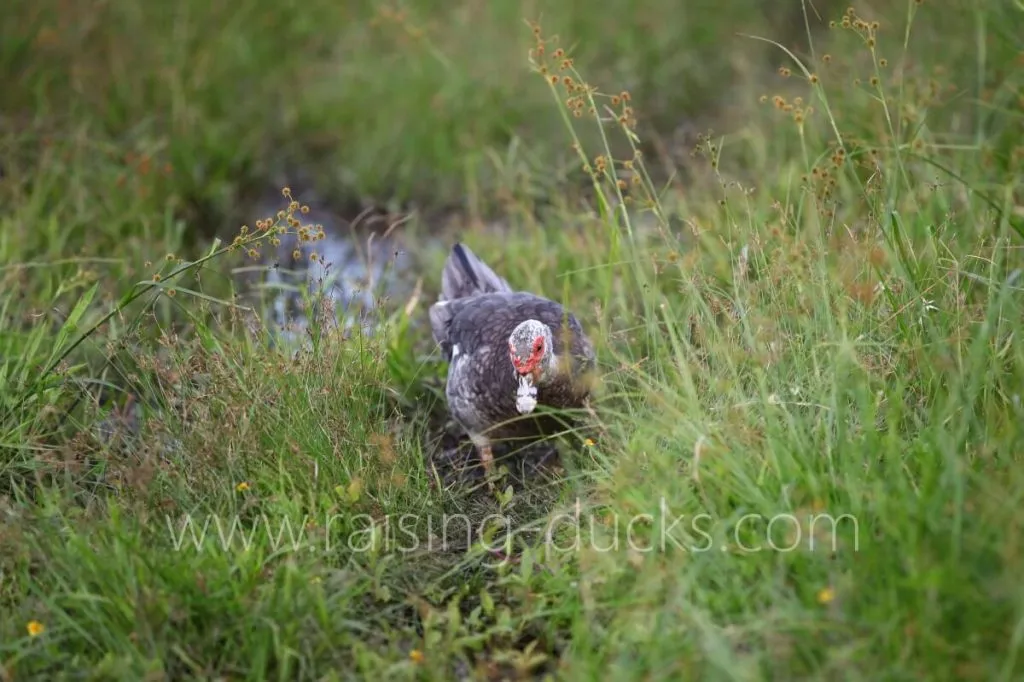
If no limits are imposed on their freedom, most ducks will only use a couple of acres. They will probably stay within a 400-foot radius of their home, and likely less than that.
Their mileage will vary, of course. One factor that will affect how far your ducks roam is how well they like the forage. The better the forage, the less they will range, because they will find what they want to eat without having to go so far.
I have heard that chickens and ducks range many times farther in winter than they do in summer. Another factor is breed; Pekins will not range as far as active breeds like Runners.
As mentioned before, our ducks are fenced into an area spanning aproximately three acres. However, before we installed this fence, they rarely ventured beyond these three acres.
Will they run away or get lost? How do you keep ducks on your property?
They probably won’t run away. Ducks won’t travel far on foot and are likely to return to wherever they get food. They are good at finding their way back home (within a reasonable distance), so they probably won’t get lost either.
There are two exceptions, however. One is ducks that can fly. There is a high chance that unclipped ducks will fly away and never return. (Ducks that can fly may be more able to escape predators, however.) The second is ducks that have access to a creek. There’s a chance they’ll swim down the creek and won’t walk back.
Ducks will definitely explore, so if your property is small, they may venture beyond its borders. You can’t train ducks to understand property boundaries. The only way to keep ducks on a small property is to build a fence.
When can ducklings free range?
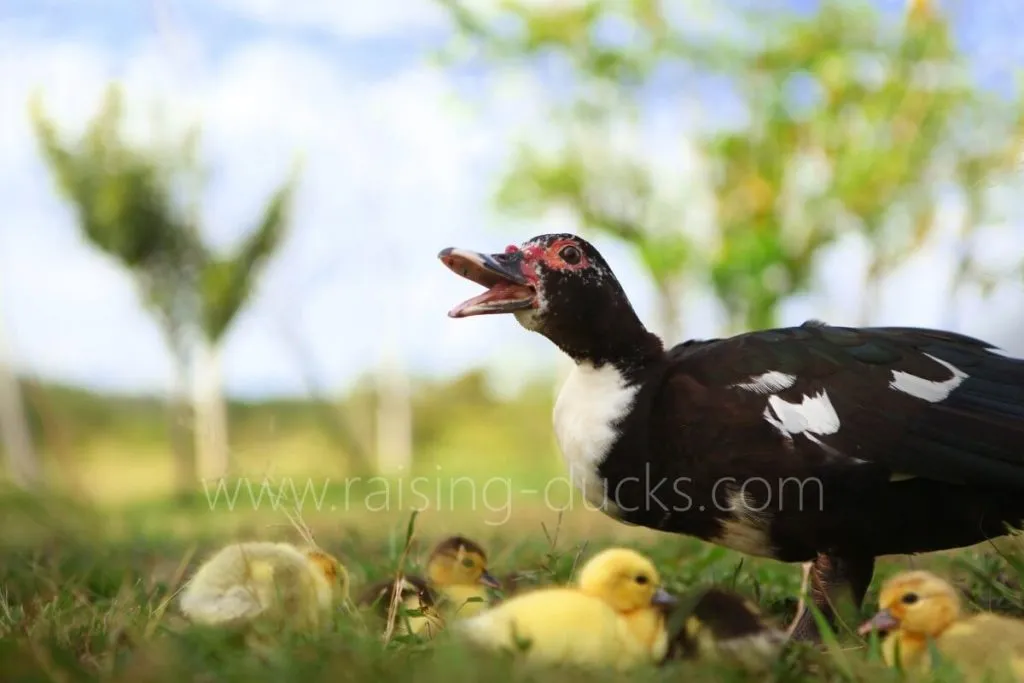
Ducklings are particularly susceptible to predators. In most cases, I recommend waiting until your ducklings are close to fully feathered and at least half of their adult size before allowing them to free-range. If they have a mother to care for them, they can free-range sooner.
I let my ducklings, who always have a broody mom, free-range within their first week. I’ve never lost one. But I wouldn’t recommend this to everyone.
How to start free-ranging
If you just got your ducks, leave them penned up for a week or two (or a minimum of three days) so they learn to feel at home in their new surroundings. They need time to settle in, learn where their food is, and accept their new home. If you let them free range right after moving them to a new home, they may try to return to their old home.
The first time you let your ducks out, supervise them. They aren’t likely to wander far on their first time out, but just in case, you might consider limiting the duration of their free-ranging the first time to be sure you can get them back in. It’s also helpful if the ducks are fairly friendly, so that they will be easier to herd and catch.
Don’t feed them right before letting them out. If they’re full, they won’t be as motivated to come back home for food.
Compromises and alternatives
If you want to let your ducks free-range but feel the risk of predation is too great (or want to avoid some of the other cons of free-ranging), here are a few compromises and alternatives to free-ranging.
Supervised free-ranging
Some people only let their ducks free-range under supervision. This reduces the predator risk (but doesn’t eliminate it) and enables you to keep an eye on where your ducks go and what they do.
One problem is, of course, that it takes a lot of your time. If you need an excuse to get outside, enjoy some sunshine, work in your garden, or just enjoy watching the ducks, why not try supervised free-ranging?
However, it can be hard to commit to supervising your ducks on a regular basis, especially if you’re busy, the weather’s bad, or you just don’t feel like it, so be sure your ducks still have a spacious run to spend time in when they can’t free range.
Rotational grazing
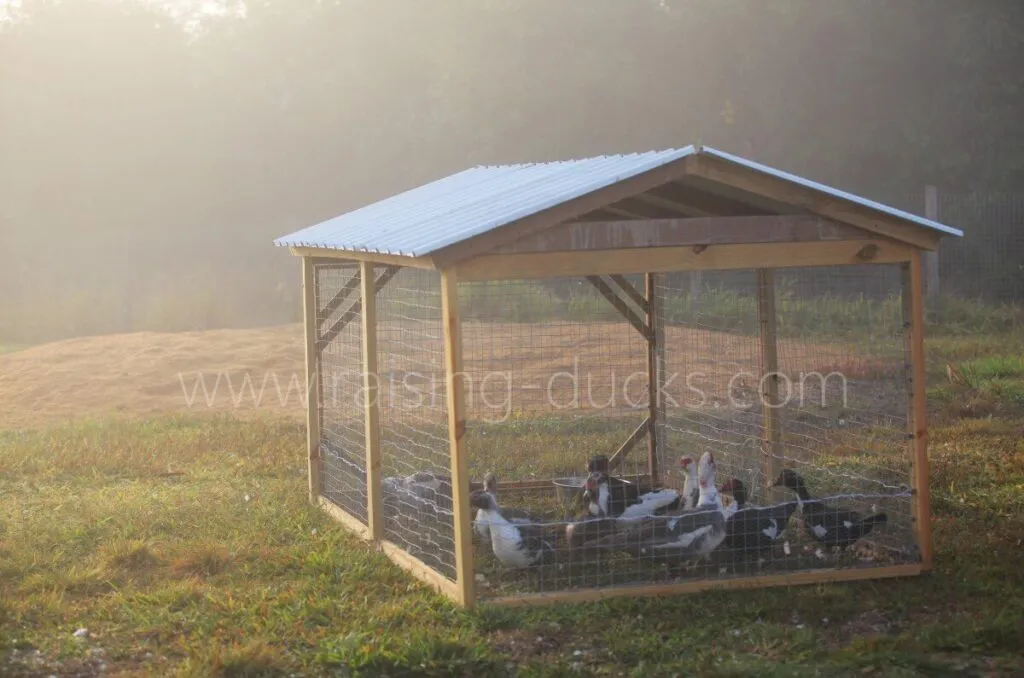
One of our mobile duck pens. Although we only use it to house ducks for the night, it could also be used as a full-time shelter for four ducks or less.
Mobile pens enable you to move your ducks to fresh foraging grounds, giving your ducks many of the benefits of free-ranging without any of the cons. The primary drawback is that mobile pens can’t hold very many ducks, since their size is very limited. For daytime or full-time enclosures, each duck needs at least 10 square feet of space. Large mobile pens have to be moved with a tractor.
View this post on Instagram
A more scaleable option is electric poultry netting, which is easy to set up, take down, and move. It doesn’t provide protection from aerial predators like a covered mobile pen would, but it’s highly effective at thwarting land predators. With electric netting, you can give your ducks an enclosure of any size you want and move it whenever you want. Some large-scale pastured poultry producers use electric netting to manage their flocks.
Leave a comment
Your email address will not be published.